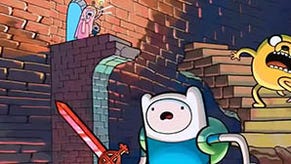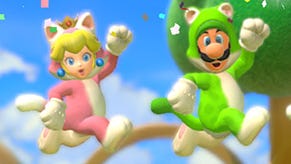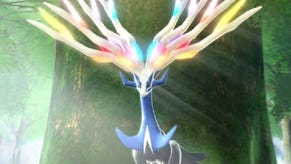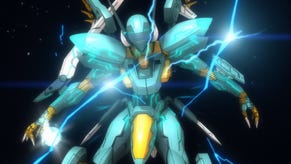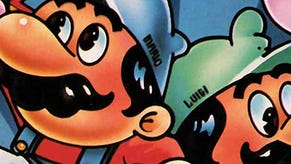Mario & Luigi: Dream Team Review
The same reliable Mario & Luigi role-playing action, but this time with a dogged refusal to shut up long enough to let you enjoy the game.
This article first appeared on USgamer, a partner publication of VG247. Some content, such as this article, has been migrated to VG247 for posterity after USgamer's closure - but it has not been edited or further vetted by the VG247 team.
Primary Reviewer, Jeremy Parish
As a fan of the Mario RPGs -- and role-playing games in general -- I was surprised to find that my feelings toward the latest entry in the series, Mario & Luigi: Dream Team, border on sincere hatred.
Now, I've played some really terrible games in my time -- be they unimaginative, unpolished, unprofessional, or even unplayable -- and despite it being neither any of these things nor terrible, I rarely dislike a game as much as I do Dream Team. At least with a truly terrible game you have freedom to enjoy it on your own terms, mock its failings, that sort of thing. Dream Team offers no such luxury. It rarely gives you more than five minutes of uninterrupted play time before wresting back control of the action to wave its hands, tell you what to do, and spell out every little detail -- be it minute mechanics or trivial story observation -- at excruciating length. And that's the problem.
The dialogue in Dream Team reminds me of an annoying super-fan, one who loves a game or a movie or a book so much that he never stops talking about it. The guy who makes you listen to his favorite album and spends the whole time talking about the production history and the nuances of the band, so you can barely hear the music. He's the guy who obsesses over a densely plotted movie, then sits next to you as you watch it and talks about each little detail that you should pay attention to, distracting you even as he spoils the plot. He's so determined for you to love his favorite things that he makes it impossible for you to do so.
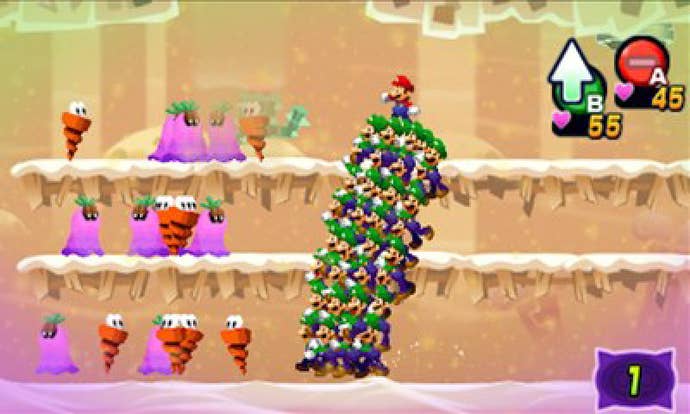
What makes Dream Team particularly maddening is that it makes this overweening voice part of the game itself. Alas, here it's not a sign of passionate enthusiasm but rather of the unrelenting creative timidity of the game's creators. Terrified at the prospect of players becoming the slightest bit lost or being forced to use even an iota of brain power to figure something out, Dream Team's designers (developer Alphadream) fall over themselves to point out every little gameplay detail and every little joke. Then they circle back around a few times to remind you what they said in the previous intrusive dialogue snippet. And then they tell you again, just to draw a line beneath it.
This happens throughout the entire game, not just in the opening hours. Long after you finally make your way into the proper exploration where you should be well clear of tutorials -- which is nearly 10 hours into the game! -- Dream Team continues to remind you how to solve problems, even those whose solutions it's already demonstrated. At no point are you left to your own devices. At no point do you have to be creative or clever. At no point are you treated like a mentally competent human being capable of operating Mario & Luigi -- despite it being the world's kid-friendliest RPG series. "Look," the game constantly reminds you, "I'm worried that you might be too stupid for this. Let's take it slowly."
Something tells me that Dream Team's suffocating condescension is a last-minute addition, a panicked overreaction to reception of last year's Mario RPG, Paper Mario: Sticker Star. That particular adventure operated at the far opposite end of the spectrum, avoiding pop-in dialogue and story events and generally keeping plot to a no-nonsense background hum. It put exploration, puzzle-solving, and combat front and center. In a few places, its puzzles could be maddeningly vague, however, and this drew some flack from lost players. So rather than take the chance that people might ever have the slightest doubt about what to do next, it seems Nintendo hastily shoehorned in a constant, unrelenting onslaught of babbling NPCs.
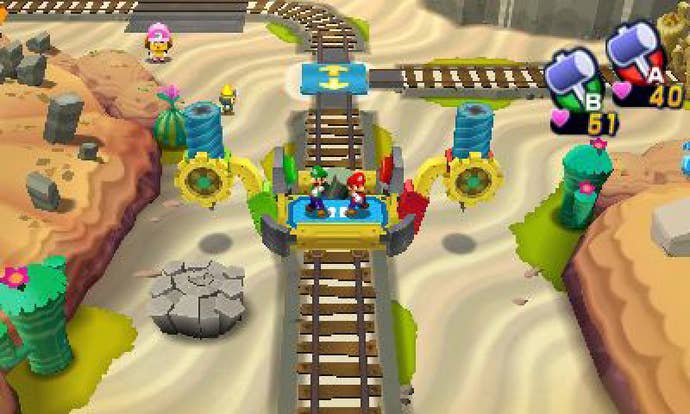
The irony is that Sticker Star itself seemed like a reaction to its own predecessor, the excessively talky Super Paper Mario. So we've basically come full circle here, with the idea of a happy medium clearly a foreign concept for this franchise. Anyway, the dialogue hardly seems like the only instance of the team second-guessing its work at the last minute. You'll notice other signs if you pay attention... like the way save boxes appear throughout the game, despite the fact that you can save anywhere, thus making those boxes completely superfluous.
You quite literally cannot enter a new screen of a Dream Team dungeon map -- whether in the top-down RPG mode or the side-scrolling platformer-lite areas -- without some chatty Cathy pausing the action to tell you exactly what you need to do here, or the game seizing control of the camera to make it abundantly clear how to solve each minor puzzle. There's no sense of discovery in this game. You'll never feel the satisfaction of figuring out a tricky mystery. The potentially clever dungeon gimmicks cease to be engaging, reduced to mundane impediments. It's a 30-hour exercise in going through the motions.
What really makes it all so disappointing is that Dream Team feels like a massive step backward from the previous Mario & Luigi -- 2010's brilliant Bowser's Inside Story -- in a number of ways. The quest revolves around Luigi this time instead of Bowser, replacing the bizarre egocentric panache of the Koopa king's action sequences with the other Mario brother's muted, sad-eyed lack of self-esteem. Where Bowser subverted gameplay conventions with his audacious rage and general stompiness, Luigi's dream self just kind of makes the basic action a little flashier. The graphics are prettier, and the elaborate showcase battles are more elaborate than ever, but it feels like more of the same -- or, at times, less of the same.
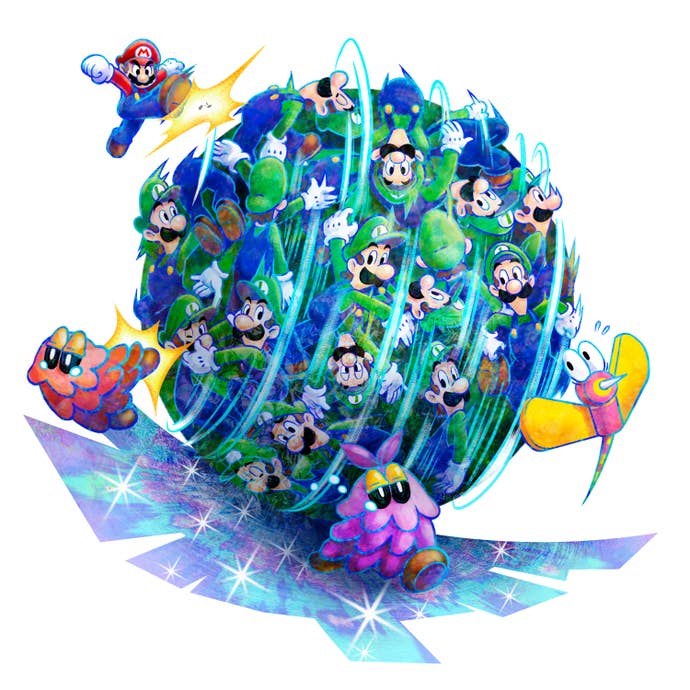
Worse, the plot-driving characters, a race of creatures called the Pi'illo, are uninteresting to a fault. Some players seemed really put out that last year's Sticker Star had been designed under the mandate that the creators could add no new characters, but the limitation did wonders for the game: It legitimately felt like a Mario RPG. Dream Team feels like Mario and Luigi wandered into someone else's crummy C-tier RPG. With its host of pointless characters that have nothing of value to say but still won't shut up, I'd say the C-tier RPG in question is Golden Sun.
To their credit, Dream Team's localization staff seemed to realize just what an obnoxious amount of dialogue exists in the game, and they did their best to punch it up. The English script is alternately wry, witty, and quirky. But there's only so much a clever translation can do when the story and characters are so aggressively devoid of substance. The localization transforms the suffocating miasma of interruptions into a haze of funny interruptions, but the English text still has to slot into all the spots that the original Japanese source material occupied, and all the jokes in the world can't keep this constant blather from slowly choking the joy out of your existence.
Still, despite the interminable chatter, Dream Team is hardly irredeemable. Even if its core gimmick seems like an overly lengthy retread of a sweet, simple joke from the original Mario RPG (nebbishy Luigi wistfully longs to be as heroic as his brother) and proves to be much less entertaining than Bowser's id-fueled rampages, Mario & Luigi's fundamental game mechanics remain as engaging as ever. As always, the battle system combines core Mario concepts with reactive, timing-driven controls that go a long way toward livening up the traditionally staid concept of turn-based combat. Familiar Mario world elements appear in forms uniquely twisted to fit the needs of a role-playing game, though these tend to take a backseat to the terminally uninteresting Pi'illo people.
It's a solid game; it's just that everything here has been done better already, and less obtrusively at that. For a Mario & Luigi fan like me, Dream Team should have been a slam dunk. Instead, it ran down the clock with constant pep talks.
Secondary Reviewer, John Benyamine
I'm a little late with my second opinion of Mario & Luigi: Dream Team, but I've put a good 15 hours into the game and have a slightly different take on things. For additional context, I didn't get a chance to play the previous game in the series, Bowser's Inside Story, but I was a huge fan of Superstar Saga. Also, I am not particularly experienced with RPGs; the last one I played was Ni No Kuni, and before that, I can't say I specifically remember.
I agree wholeheartedly with Jeremy's assessment of the game's biggest fault. The tutorials and dialogue just keep coming, giving you very little chance to get into the game for an extended period of time. One of the reasons I enjoy RPG games is the ebb and flow of the action, where a longer sequence of battles and leveling is bookended by (hopefully) interesting dialogue and story. The problem with Dream Team is it's all bookends!
Saying the dialogue is verbose is an understatement -- these people just won't shut up. I found myself plowing through a lot of the story because it was intertwined with the kind of hand-holding reserved for an increasing amount of Nintendo games, and it quickly became an annoying frustration.
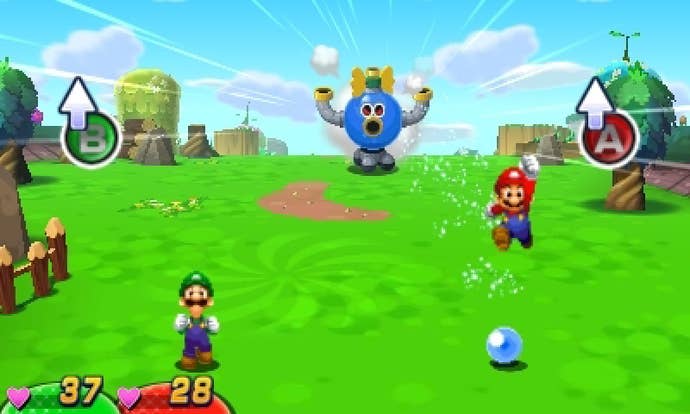
That being said, there are some really good elements in the game. The game's fight sequences, with their mix of traditional turns and button-timed extra hits, are interesting and, the more I think of it, the game's problems are exacerbated by the fact that the core gameplay mechanics are so fun.
The special moves in the form of Bros. and Luiginary attacks are also creative, with dream sequences that give you a nice kinda-side-scrolling break in between your overworld travels. And while I wish there were more puzzles (and more difficulty), I was surprised to find as many as there were.
There are also moments where Dream Team is just plain funny. The game's script has some clever bits to it, and even the slapstick moments are delivered with great comic timing. You know Mario and Luigi crossing that creaky bridge is going to end in disaster. This is a joke that's been told in time immemorial, but it's delivered with such ludicrous Foley effects that you can't help but laugh and appreciate the effort.
Lastly, there is a really interesting sequence relatively early on when you first enter Luigi's thoughts as Mario. Subliminal messages float around the screen, each representing Luigi's deepest thoughts about his big brother. Heroic things, common pleas for help, even a reference to Mario's skill as a sharp dresser (huh).
For whatever reason, I felt there was an inherent sweetness in that sequence touching on a deeper relationship that hasn't yet resurfaced, but I hope it does. It may not be one of the better games in the Mario & Luigi series, but these surprising moments enveloped by a solid gameplay mechanic make it worthwhile. Even if they can't just be quiet for more than a few minutes.
The Details
- Visuals: Wonderfully detailed sprite work meshes perfectly with the colorful 3D backgrounds. Not a technical tour de force, but undeniably artistic.
- Audio: Yoko Shimomura's compositions lend the score far more grit than you might expect in an all-audiences RPG based on the Super Mario series. The traditional Mario sound cues help tie it all together.
- Interface: The usual Mario & Luigi fare, mapping a potentially complex control scheme to a few simple, intuitive buttons. Unfortunately, constant interruptions to convey tips and advice underscore the creators' innate lack of confidence in their own work's fundamental elegance, and the endless nattering makes Nintendo's previous nanny state offender (The Legend of Zelda: Skyward Sword) seem like Dwarf Fortress by comparison.
- Lasting Appeal: It's a suitably lengthy adventure, but the hideous, choppy pacing means you'll probably never want to replay it. In fact, if you have any degree of experience with video games whatsoever, you may have trouble getting through its didactic jabbering even once.
ConclusionIt's a quality game, but you can actually feel your soul leaving your body the dozenth time that stupid star sprite guy floats out to reiterate some basic point he just made two minutes prior. In the end, we learn the truth behind the game's subtitle: Dream Team wants nothing more in life than to put you to sleep.

